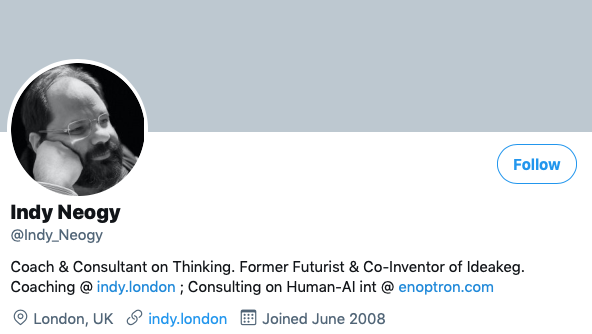♦ 🐆 1 min, 🐌 3 min
How creators experiment? Q & A with Indy
Indy Neogy from London is currently a coach on "hard problems" and a consultant on Human-Human and Human-AI interaction.
What, in your opinion, crashes our habits the most?
Life. Or, to be more specific, what crashes the habits is life which is full of little continuous changes and unexpected events. A habit is essentially some kind of routine - and routines take place inside a context. That context might be an environment: your office, your apartment or maybe your neighbourhood. Or the context change could simply be a change of your "normal schedule." When elements of the context change, they can derail the habit. Not just in the big obvious ways, but the small ways too. It doesn't take a disaster to disrupt your life. Suppose the person you live with starts getting up half an hour earlier and using the bathroom and kitchen at that slightly different time. That can disrupt one of your habits. Our lives are interlocked sets of activities. Minor changes in one part of our life can turn a routine in another part of our life into complete chaos.What do people disregard in habit formation?
One thing that a lot of people disregard in habit formation is that it's not about willpower. It's about a genuine wish to do something. If you really wish to do it, you will.Idea of continuous improvement.
Or Life can be better.I encountered the idea of continuous improvement very early in my engineering life. What's important to me about the idea is that small changes add up over time.The secret to life changes is not doing one "big bang" change, but regularly changing and improving lots of small parts of life every day. But the little changes need to be consistent. Every time you change something, change one aspect of the habit. Change one variable, see what happens and then proceed. If you change multiple things at the same time, you won't know which change actually worked. It's the same as in science. Make one change observe, repeat.What is the one thing everyone should experiment with?
For the most significant impact, it's a cliche, but sleep. Changing your approach to sleeping times and routines can have the biggest payoffs in terms of energy and morale. For something a little less obvious, I'd say experiment with your priority list. If you usually do "big important things" first in the morning and "little admin tasks" in the afternoon, try doing it the other way around. Even if you chose your current work pattern using sound logic and self-knowledge, a week of changing it around will give you a new perspective on how you prioritise. The experiment will make you more resilient when life throws an unexpected change your way.Get notified & read regularly 👇